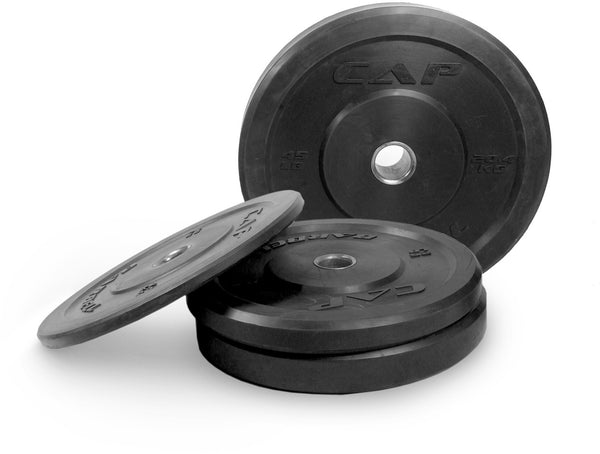Your Cart is Empty
October 12, 2023 3 min read
Bumper plates are an essential piece of weight-lifting and CrossFit equipment. They are highly durable, made out of rubber and steel, and come in various weights. The main purpose of bumper plates is to protect the floor during heavy lifts such as deadlifts, cleans, and snatches.
Shop The Collection: Bumper PlatesThe plates are designed to be used on a weightlifting platform or any other type of lifting station that has a raised surface. The reason they are called "bumper" plates is because of the way they absorb impact when dropped from overhead positions. The plates are designed to reduce shock to the floor and make sure that the barbell can be safely dropped without causing damage.
 Shop The Gear: CAP Barbell Olympic Bumper Weight Plates, from $13.99 USD
Shop The Gear: CAP Barbell Olympic Bumper Weight Plates, from $13.99 USD
Bumper plates are usually sold in pairs, with each plate having a different weight. This allows you to adjust the amount of weight you are lifting according to your strength and fitness level. For example, if you wanted to do a deadlift with 200lbs, you would need two plates of 100lbs each.
The primary benefit of using bumper plates is safety. As mentioned before, the plates reduce the impact of dropping the barbell onto the ground. This prevents flooring or even injury to yourself or those around you.
The plates also help you stay consistent with your technique. When performing Olympic lifts, it's important to keep your form correct throughout the entire lift. Bumper plates will help you by ensuring that the barbell comes to rest on the floor at the same height every time. This ensures that each rep is completed with the same technique, helping to prevent injury and maximize results.
Finally, bumper plates are great for building strength and power. By allowing you to safely drop the barbell from overhead positions, you can gradually increase the weight and intensity of your lifts. This helps you to build muscle and strength more quickly than if you were simply lifting traditional weight plates.
Bumper plates come in a variety of types, including rubber, steel, and composite. Rubber bumper plates are the most common and best choice for home gyms. These plates come in various weights and colors, making them easy to differentiate between sets. Steel bumper plates are more expensive but are the best choice for commercial gyms due to their durability and resistance to warping over time.
Composite bumper plates are a combination of rubber and steel, providing the benefits of both materials. These plates are more expensive than rubber plates but are less prone to warping and provide greater protection for the floor. The downside is that they are heavier than rubber plates, which can make them difficult to maneuver for some people.
Using bumper plates is relatively simple. Begin by placing the plates onto the barbell sleeve. Make sure that the plates are secured properly and won't move when you start to lift. Once the plates are secure, you can begin your lift. Make sure to keep your form correct and use proper technique throughout the entire lift.
When you reach the top of the lift, you can either lower the barbell slowly or drop it from overhead. If you choose to drop it, make sure you do so in a controlled manner. It's important to keep the plates on the sleeve and not let them fall off. This will help protect the floor and ensure that you don't injure yourself.
Bumper plates are an essential piece of weightlifting and CrossFit equipment. They provide protection for the floor and allow you to safely drop the barbell from overhead. They come in various types, including rubber, steel, and composite, and are available in a wide range of weights. With proper use and care, bumper plates can help you get stronger and stay safe while working out.
Shipping Protection gives you peace of mind while saving you time and money.
Shipping Protection provides coverage for eligible orders that are lost or damaged in transit, or stolen after delivery has been confirmed by the carrier. MAGMA Fitness, through its partners, administers the protection program and may receive compensation for these services. Coverage is subject to the terms, conditions, and exclusions outlined in our Shipping Protection Terms & Conditions.